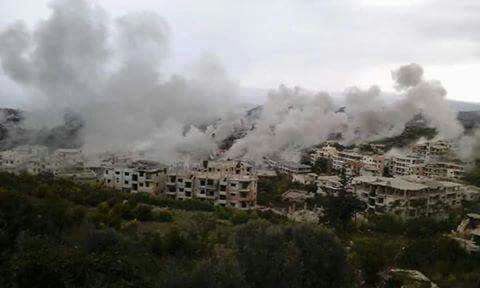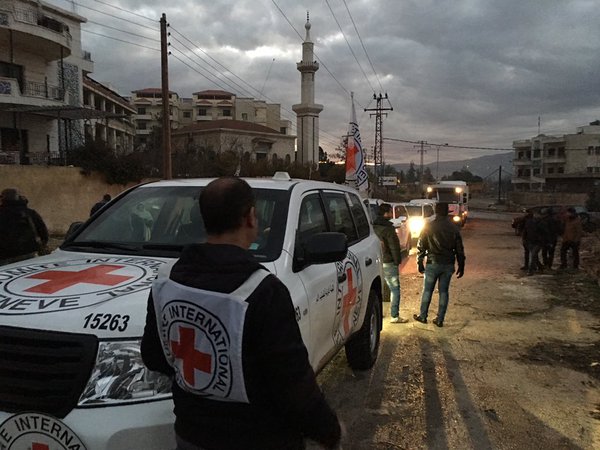PHOTO: Aid enters besieged Madaya late Monday afternoon
LATEST
- Russia Warplanes Kill 25 in Another Attack on Idlib Town
- Opposition Coordinator: US Backtracking Over Regime To Accommodate Russia
- State TV: Regime-Russian Offensive Captures Salma in Latakia Province
- Kurdish-Led Force Moves West of Euphrates, Advance on ISIS Town of Manbij
- Putin: We Support Both Syrian Army and “Armed Opposition”
- Putin: Saudi-Iran Dispute Complicates Syria Talks
Four trucks with aid finally reached the opposition-held Madaya, northwest of Syria’s capital Damascus, after a six-month regime siege in which an estimated 60 people have died of starvation.
The delivery was only the second since last July to the town of about 40,000 people. A convoy in mid-October provided a few days of food and supplies, but further assistance was blocked, including a planned relief effort in late December.
The UN refugee agency UNHCR said, “The first four trucks, carrying essentials including blankets and food packages of rice, oil and lentils were allowed into the town, where volunteers began unloading them in the dark, watched by groups of hungry people, including children.”
UN emergency relief coordinator Stephen O’Brien said 400 people, many of them severely malnourished, needed immediate medical evacuation: “They are in grave peril of losing their lives.”
Plans are for 44 trucks to move in assistance over the next few days. The opposition site Eldorar said 120 tons of aid will arrive on Thursday — this will include wheat flour, which was delayed yesterday because of the large amount requested.
At the same time, aid was delivered to the regime enclaves of al-Fu’ah and Kafraya, long surrounded by rebels in Idlib Province in northwest Syria.
Residents of Madaya lined up behind a security barrier from 5 a.m. The trucks, in a convoy of 49 vehicles, reached the town in the afternoon, but were held up for hours, reportedly until the provision of the assistance to al-Fu’ah and Kafraya could be confirmed.
Facing international attention to the crisis, the Assad regime relented and agreed to the UN-supervised operation last Thursday. However, another five people were confirmed to have died from starvation on Sunday, and two perished on Monday morning.
Khaled Mohammad, a nurse anesthetist said weak and collapsing patients continued to enter the health center as people gathered to receive aid, including fava beans, sugar, hummus, and canned tomatoes.
Residents told visiting journalists of people resorting to the eating of cats and grass and digging through garbage to find food. They spoke of a kilo of rice costing up to $230. One teenager said, “We sought food from the fighters but they refused to give it to us.” A young woman asserted — in filming “under Syrian Government media guidelines” — “Ahrar al-Sham and Jabhat al-Nusra have food but they do not feed anybody.”
Mousa al-Maleh, the head of the local committee in Madaya, expressed concern about both the size and pace of the delivery:
The amount of items that have arrived on these trucks are too little and will not be enough to last long. This is a joke. I call on the international community to help end this siege and help the people of Madaya.
The local committee said the aid included a 15-day supply of barley.
The spokesperson for the Red Cross delegation in Syria, Marianne Gasser, welcomed Monday’s breakthrough but said more had to be done:
This is a very positive development. But it must not be just a one-off distribution. To relieve the suffering of these tens of thousands of people, there has to be regular access to these areas.
A US-based Syrian activist said five US citizens are trapped in Madaya.
The Syrian-American family left Pennsylvania 10 years ago to grow and export fruit from the resort town.
“Right now, my kids are starving from hunger,” the mother of the family told US outlet MSNBC on Monday. “My baby is 3 years old. All day long, the only words he says are: ‘I’m hungry. I need food.’”
Her husband, octagenarian mother-in-law, and three of the couple’s five children hold dual nationality.
The US State Department would not confirm that the five are American citizens, saying it does not “comment on citizenship claims.”
Russia Warplanes Kill 25 in Another Attack on Idlib Town
Russian warplanes have reportedly killed another 25 people in the town of Ma’arat al-Num’an, south of Idlib city in northwest Syria.
Journalist Hadi al-Abdallah said one civil defense was among the dead, while four were among dozens wounded.
The attack comes three days after Russian strikes killed 96 people in the town, with attacks on a courthouse and a prison run by the jihadist faction Jabhat al-Nusra.
See Syria Daily, Jan 10: Another Mass Killing by Russian Airstrikes
Opposition Coordinator: US Backtracking Over Regime To Accommodate Russia
The head of the opposition-rebel negotiating team has said the US is backtracking in the Syrian crisis, including the issue of President Assad’s future, to accommodate Russia.
Riad Hijab, a former Prime Minister, said, “[The Americans] want the creation of a government whereby the regime would leave us, the opposition, a few ministries.”
He blamed the US for “holes and ambiguities” in a UN Security Council resolution, adopted December 18, for an 18-month transition.
Both the resolution and international talks in New York issued proposals with no reference to Assad’s stay in power.
“The Russians and Americans did not cite Assad and did not talk about his departure and that is clear backtracking,” Hijab said.
He linked the US shift to past American retreats, referring to the President’s step back from military intervention after the Assad regime’s chemical attacks near Damascus in August 2013: “Obama didn’t want [a no-fly zone]….With the red lines on chemical weapons, he took out the weapons, but not those who used them. I don’t think history will forgive Obama.”
Asked whether the opposition will attend talks with the regime, sought on January 25 by the UN and international actors, Hijab said:
The choice is extremely difficult. If we don’t go to the negotiations they will say we don’t respect the UN resolutions, but our people are being bombed and starved….
If we go and they fail, it would be a catastrophe for Syrian society and it would be the world that pays the price.
State TV: Regime-Russian Offensive Captures Salma in Latakia Province
State TV is claiming that the Syrian military, assisted by intensive Russian airstrikes, has suddenly taken Salma, the most significant rebel-held village in northern Latakia Province.
The offensive, launched in October, advanced this week by taking a series of villages. On Monday, it attacked Salma from four directions, as Russian warplanes used vacuum missiles among their weapons.
Rebels and local sources say fighting is continuing in the village.

The rebel faction Ahrar al-Sham had warned of “critical conditions” for defenders and asked all groups for reinforcements and/or attacks on other fronts to stem the offensive.
The rebels held Salma since July 2012 as one of their primary positions within Latakia, one of the bases of the Assad family and regime.
Claimed footage of a Russian general with regime commanders:
Regime forces marching with flags and spraying graffiti on walls:
Night-vision footage of regime troops:
Kurdish-Led Force Moves West of Euphrates, Advance on ISIS Town of Manbij
The Kurdish-led Syrian Democratic Forces, accompanied by US special forces, have reportedly advanced west of the Euphrates River near the Islamic State-held town of Manbij in Aleppo Province.
The opposition Local Coordination Committees said from “reliable sources” that about 300 fighters with heavy weapons moved from the Tishrin Dam area on Saturday. The Kurdish-led force also included the local Arab “Shams al-Shamal” battalion, whose members are mostly from Manbij. An estimated 30 Americans are also involved.
The SDF captured the Tishreen Dam on the Euphrates last month. The advance raised the prospect of a westward drive, despite previous Turkish warnings of a “red line” at the Euphrates. US special forces reportedly held the position on the west bank to meet Ankara’s condition.
However, the SDF is said to be planning an offensive on Manbij, held by the Islamic State since it turned on rebels in early 2014. The LCC said on Monday that there were “fierce clashes” between the SDF and ISIS in the villages of Sakawayah and Tal Arsh near Manbij.
Putin: We Support Both Syrian Army and “Armed Opposition”
Russian President Vladimir Putin has insisted that Moscow is supporting “both the Assad army and the armed opposition”.
Putin told Germany’s Bild newspaper that the assistance was to “hundreds, thousands of armed people fighting Islamic State”: “We coordinate our joint operations with them and support their offensives by airstrikes in various sections of the frontline.”
He said some of those supported “have publicly declared this” and “others prefer to remain silent, but the work is on-going”.
There is no evidence that any rebel faction has received Russian help. However, Moscow’s airstrikes have indirectly — and directly, according to the rebels — assisted the Kurdish-led Syrian Democratic Forces, which is fighting ISIS and has also clashes with rebel groups in northern Syria.
The Russian President insisted that diplomats and media were “telling lies” that Moscow’s aerial attacks were concentrated on opposition-held territory rather than the Islamic State: “Look, the videos that support this version appeared before our pilots even started to carry out strikes against terrorists. This can be corroborated.”
Analysts, assessing Russia’s videos and other evidence, have estimated that more than 80% of Moscow’s attacks have been on opposition territory. Last week, a US Government spokesman put the figure at 70%.
Russia has destroyed or damaged infrastructure and civilian sites since it began bombing on September 30, including schools, bakeries, markets, a water treatment plant, and a mosque. More than 1,000 civilians have died in the attacks.
Putin: Saudi-Iran Dispute Complicates Syria Talks
Russian President Vladimir Putin has said that a diplomatic row between Saudi Arabia and Iran is complicating resolution of the Syrian crisis.
Putin told the German newspaper Bild:
It hampers the efforts to settle the Syrian crisis and the fight against terrorism, as well as the process of halting the inflow of refugees to Europe, that much is certain.
As for whether this will lead to a major regional clash, I do not know. I would rather not talk or even think in these terms. We have very good relations with Iran and our partnership with Saudi Arabia is stable.
Saudi Arabia has broken diplomatic relations with Iran. Four of the five other members of the Gulf Cooperation Council, Somalia, Djibouti, and Sudan have also suspended or downgraded links.
The crisis was sparked by the Saudi execution of a prominent Shia cleric on January 2, followed hours later by an attack on the Saudi Embassy in Tehran.
See Iran Daily, Jan 11: Tehran Goes on Attack Against Saudi Arabia

